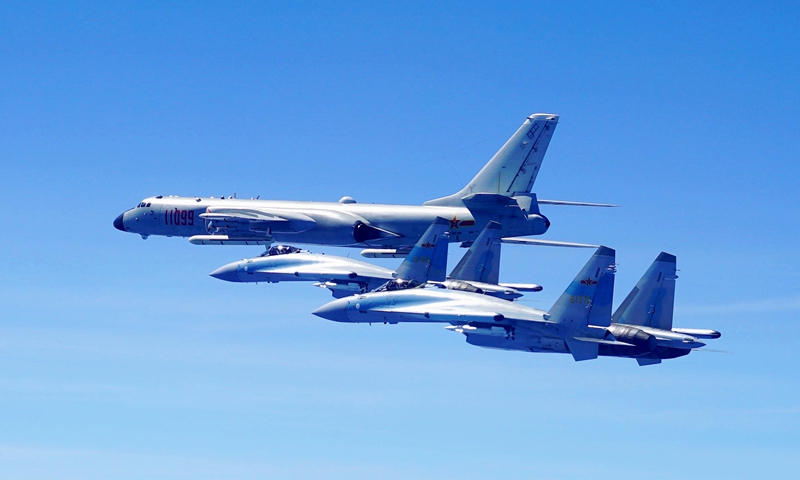
Editor's note: CGTN's First Voice provides instant commentary on breaking stories. The daily column clarifies emerging issues and better defines the news agenda, offering a Chinese perspective on the latest global events.
Tsai Ing-wen is changing the status quo across the Taiwan Straits, destabilizing the region and adopting policies and language pushing the island closer to war. She is taking advantage of the chaotic U.S. domestic political situation to attempt to deconstruct the one-China principle and turn Taiwan into a U.S. military stronghold, achieving her goal of separatism.
This is a dangerous game. Since Tsai took office in 2016, she has continuously pushed cross-strait ties to the brink by flirting with a formal declaration of independence, but always stopping short of making one. On October 10, she took her latest provocative step, declaring, "We will continue to bolster our national defense and demonstrate our determination to defend ourselves in order to ensure that nobody can force Taiwan to take the path China has laid out for us."
Peace in the region is based on maintaining the status quo that has worked since China restored its lawful seat in the United Nations in 1971, and since the U.S. established diplomatic ties with China in 1979. This peace has been based on the understanding that there is only one China. The U.S. under the Biden administration has affirmed it still upholds this policy.
However, to the delight of Taiwan separatists like Tsai, the Biden administration has also created a series of military alliances intended to encircle and threaten China, including flirting with the idea of establishing the island of Taiwan as a Western military base. In the latest escalation, the Biden administration has admitted it has U.S. troops based on the island. The U.S. is also pressuring its allies to send naval ships into the region to increase military pressure. Republican Senator Marco Rubio, who has presidential ambitions, called Taiwan a "nation" on Sunday and said, "We look forward to further strengthening our relationship in the years and decades to come."
The kinds of actions the U.S. is taking right now to encourage Taiwan separatists like Tsai are the exact tactics that foreign powers have long used to keep China divided and weak. U.S. politicians need to look beyond the next election cycle to realize how devastating a declaration of Taiwan independence would be.
In short, it would be catastrophic. These actions, declarations and rhetoric that blatantly treat Taiwan as a separate political entity from China are escalating the situation and pushing China into a corner where it must act to ensure its territorial integrity. Tsai wouldn't dare to declare independence without America's backing and support. But with American politicians offering their unreserved rhetorical support for Taiwan and their military presence, Tsai could fall deeper into the delusion that would lead her to make the wrong political judgement and try to formally peel Taiwan away.
Then, war would ensue.
What we are seeing is the same game that's been played over and over again. Taiwan is being turned into a chess piece by U.S. politicians to serve their own interests. Under the atmosphere of extreme partisanship, foreign policy has been subsumed by narrow domestic electoral considerations, and both major parties have fought to show the U.S. public they are "tough on China." And many are trying to outflank each other by taking even more extreme positions on Taiwan in order to benefit from anti-China sentiment.
And Tsai has been taking advantage of the fact that both former President Donald Trump and current President Joe Biden would attempt to score domestic political points by bulldozing international precedents or walking on the edges of what's acceptable. The U.S. seems to be ratcheting up tension in the Taiwan Straits in order to distract the public from domestic problems. Getting votes is the driving force, not weighing what the long-term ramifications would be for the U.S. or its soldiers.

Two Su-35 fighter jets and an H-6K bomber fly in formation on May 11, 2018. The People's Liberation Army (PLA) air force conducted patrol training over China's island of Taiwan. [Photo/Xinhua]
Tsai sees these big shifts in the world's geopolitical landscape and U.S. domestic politics as giving Taiwan its best chance to shift the status quo and establish the island as an independent nation that is militarily allied with the U.S. against China. Her provocative moves are pushing the U.S. to abandon its "strategic ambiguity" and commit the lives of its sons and daughters to fulfill her separatist dreams. In exchange, the U.S. gets a military base to box China in.
Chinese President Xi Jinping had declared that China is committed to the peaceful reunification of Taiwan and the motherland under the "One Country, Two Systems" principle. But he also noted that "Taiwan independence separatism is the biggest obstacle to achieving the reunification of the motherland, and the most serious hidden danger to national rejuvenation."
The U.S. needs to ask itself what it has to gain and lose by letting the current Taiwan authority end decades of stability by changing the status quo in the Taiwan Straits. The U.S. must make sure it does not once more sleepwalk into an unwinnable, decades-long conflict it does not understand or expect. And it must understand the price of incurring the wrath of all Chinese people.

 中文
中文





